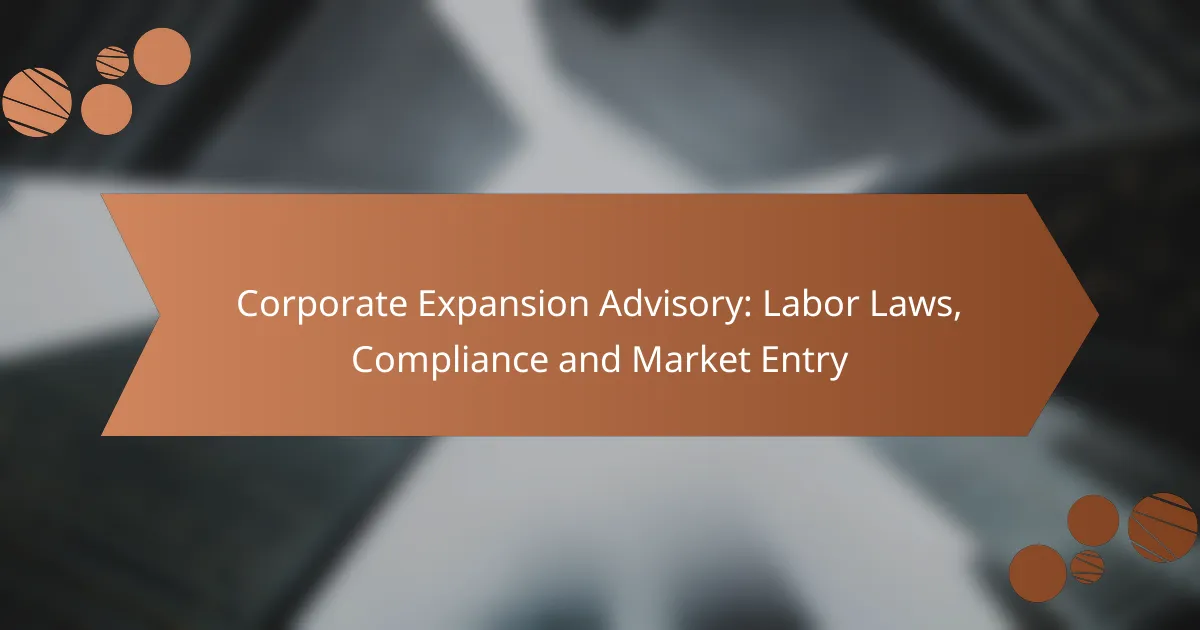Corporate expansion presents significant compliance challenges, as businesses must navigate a complex web of regulations, labor laws, and trade requirements. To mitigate regulatory risks, companies should adopt proactive strategies, including thorough risk assessments and compliance training, ensuring they meet both local and international standards while safeguarding against potential penalties.

What are the compliance challenges in corporate expansion?
Compliance challenges in corporate expansion involve navigating a complex landscape of regulations, labor laws, and trade requirements. Companies must ensure they adhere to local laws while aligning with international standards to mitigate risks and avoid penalties.
Understanding local regulations
Understanding local regulations is crucial for successful corporate expansion. Each country has its own set of laws governing business operations, including taxation, environmental standards, and employment practices. Companies should conduct thorough research or consult local experts to grasp these regulations fully.
For example, in the European Union, businesses must comply with GDPR for data protection, while in the U.S., regulations may vary significantly between states. Failing to comply can lead to hefty fines and reputational damage.
Adapting to international standards
Adapting to international standards is essential for companies looking to operate globally. Organizations often need to align their practices with frameworks such as ISO standards or industry-specific regulations. This adaptation can enhance credibility and facilitate smoother operations across borders.
For instance, a manufacturing firm expanding into multiple countries may need to meet different safety and quality standards. Understanding these requirements early can prevent costly adjustments later in the expansion process.
Navigating trade laws
Navigating trade laws is a critical aspect of corporate expansion, especially for businesses involved in importing or exporting goods. Companies must be aware of tariffs, trade agreements, and customs regulations that can impact their operations and profitability.
For example, firms expanding into markets like China or India should familiarize themselves with local trade laws and any applicable tariffs. Utilizing trade compliance software can help streamline this process and ensure adherence to legal requirements.

How can businesses mitigate regulatory risks?
Businesses can mitigate regulatory risks by implementing proactive strategies that include comprehensive risk assessments, compliance training, and legal consultations. These measures help identify potential pitfalls and ensure adherence to relevant laws and regulations.
Conducting thorough risk assessments
Conducting thorough risk assessments involves identifying and analyzing potential regulatory risks that could impact the business. This process should include evaluating current operations, understanding applicable laws, and pinpointing areas of vulnerability.
Regularly updating risk assessments is crucial, especially when entering new markets or launching new products. Businesses should consider using a risk matrix to prioritize risks based on their likelihood and potential impact, allowing for focused resource allocation.
Implementing compliance training programs
Implementing compliance training programs ensures that employees understand the regulatory landscape relevant to their roles. These programs should cover key regulations, company policies, and the consequences of non-compliance.
Effective training should be ongoing and tailored to different departments. For instance, sales teams may need training on advertising regulations, while HR should focus on labor laws. Regular assessments can help gauge the effectiveness of the training and identify areas for improvement.
Engaging legal advisors
Engaging legal advisors is essential for navigating complex regulatory environments. Legal experts can provide insights into compliance requirements and help develop strategies to minimize risks associated with expansion.
Businesses should seek advisors with experience in their specific industry and target markets. Establishing a long-term relationship with legal counsel can facilitate timely advice and support as regulations evolve, ensuring the business remains compliant and informed.

What labor laws must companies consider during expansion?
During expansion, companies must consider various labor laws that govern minimum wage, employee rights, and workplace safety. Understanding these regulations is crucial to ensure compliance and avoid legal pitfalls in new markets.
Minimum wage requirements
Minimum wage laws vary significantly by country and sometimes by region within countries. Companies must research local minimum wage rates to ensure they are compensating employees fairly and legally. For example, in the United States, minimum wage can range from $7.25 to over $15 per hour depending on the state.
Employers should also be aware of any scheduled increases in minimum wage and adjust their payroll systems accordingly. Failure to comply can lead to penalties and damage to the company’s reputation.
Employee rights and protections
Employee rights encompass a wide range of protections, including anti-discrimination laws, family leave policies, and rights to unionize. Each country has its own set of regulations that dictate these rights, so companies must familiarize themselves with local labor laws to ensure compliance.
For instance, in the European Union, employees are entitled to various protections, including the right to paid leave and protection against unfair dismissal. Companies should implement training programs to educate management on these rights to foster a compliant workplace culture.
Workplace safety regulations
Workplace safety regulations are designed to protect employees from hazards and ensure a safe working environment. Companies must adhere to local safety standards and regulations, which can vary widely. In the U.S., the Occupational Safety and Health Administration (OSHA) sets forth guidelines that employers must follow.
To maintain compliance, businesses should conduct regular safety audits, provide necessary training, and ensure that safety equipment is available and in good condition. Non-compliance can result in fines and increased liability in the event of workplace accidents.

What frameworks support compliance during corporate expansion?
During corporate expansion, frameworks that support compliance include international standards and industry-specific regulations. These frameworks help businesses navigate complex legal landscapes and mitigate risks associated with entering new markets.
International compliance standards
International compliance standards, such as ISO certifications, provide a foundation for businesses to ensure they meet global quality and safety benchmarks. Adhering to these standards can enhance credibility and facilitate smoother entry into foreign markets.
Companies should assess relevant standards applicable to their operations, such as ISO 9001 for quality management or ISO 27001 for information security. Engaging with local compliance experts can also help identify specific requirements in target countries.
Industry-specific regulations
Industry-specific regulations vary widely and can significantly impact corporate expansion strategies. For example, the pharmaceutical sector must comply with stringent regulations from agencies like the FDA in the U.S. or EMA in Europe, which govern product safety and efficacy.
Businesses should conduct thorough research on the regulatory landscape within their industry, including environmental laws, labor regulations, and data protection requirements. Creating a compliance checklist tailored to the specific industry can help avoid common pitfalls and ensure adherence to local laws.

How do cultural differences impact compliance?
Cultural differences significantly influence compliance by shaping local business norms, expectations, and regulatory interpretations. Understanding these variations is crucial for organizations to navigate legal frameworks effectively and mitigate risks associated with non-compliance.
Understanding local business practices
Local business practices vary widely and can affect compliance requirements. For instance, in some cultures, informal agreements may hold more weight than formal contracts, which can lead to misunderstandings about obligations. Companies should conduct thorough research on local customs and practices to ensure alignment with legal standards.
Engaging local experts or consultants can provide valuable insights into these practices. They can help identify potential compliance pitfalls and recommend strategies to adapt business operations accordingly. This approach minimizes risks and fosters better relationships with local stakeholders.
Adapting communication styles
Effective communication is essential for compliance, and adapting to local communication styles can enhance understanding and cooperation. Different cultures may prioritize directness or indirectness, which can impact how compliance messages are received. For example, in some cultures, a more indirect approach may be preferred to maintain harmony.
Organizations should train their teams to recognize and adjust their communication styles based on cultural contexts. This includes being mindful of non-verbal cues and the appropriate level of formality. Miscommunication can lead to compliance issues, so fostering clear and culturally sensitive dialogue is key.

What are the emerging trends in corporate compliance?
Emerging trends in corporate compliance focus on integrating technology, sustainability, and ethical practices into business operations. Companies are increasingly adopting innovative solutions to navigate complex regulatory landscapes while prioritizing responsible practices.
Increased use of technology in compliance
The integration of technology in compliance processes enhances efficiency and accuracy. Organizations are leveraging tools such as artificial intelligence and data analytics to monitor compliance in real-time, identify risks, and streamline reporting. This shift not only reduces manual effort but also helps in maintaining up-to-date records.
For example, many firms are using compliance management software that automates tasks such as tracking regulatory changes and managing documentation. This allows businesses to respond swiftly to new regulations, minimizing potential penalties.
Focus on sustainability and ethical practices
There is a growing emphasis on sustainability and ethical practices within corporate compliance frameworks. Companies are increasingly expected to demonstrate their commitment to environmental responsibility and social governance. This trend is driven by consumer demand and regulatory pressures, particularly in regions like the European Union where strict sustainability laws are in place.
To align with these expectations, businesses should develop comprehensive sustainability policies and ensure transparency in their operations. Regular audits and assessments can help identify areas for improvement and ensure compliance with relevant environmental regulations.



